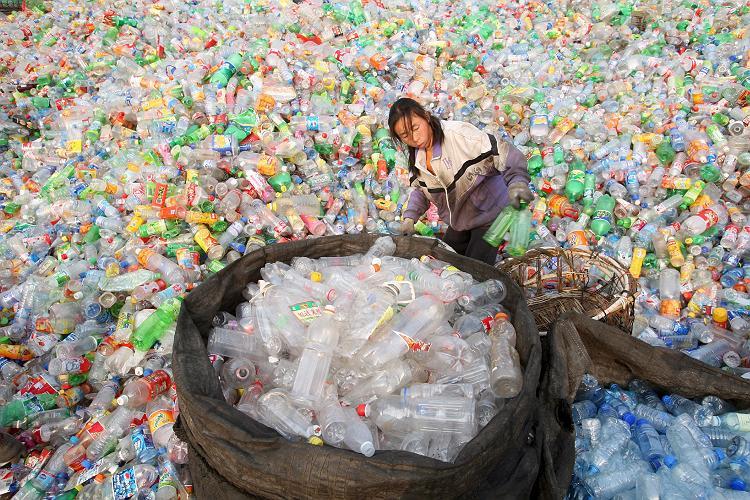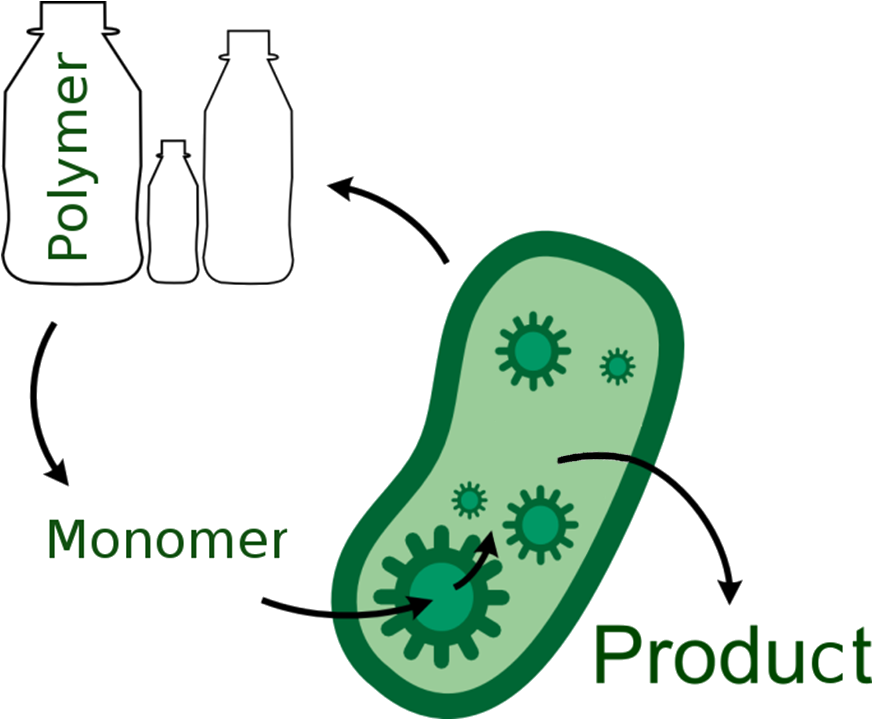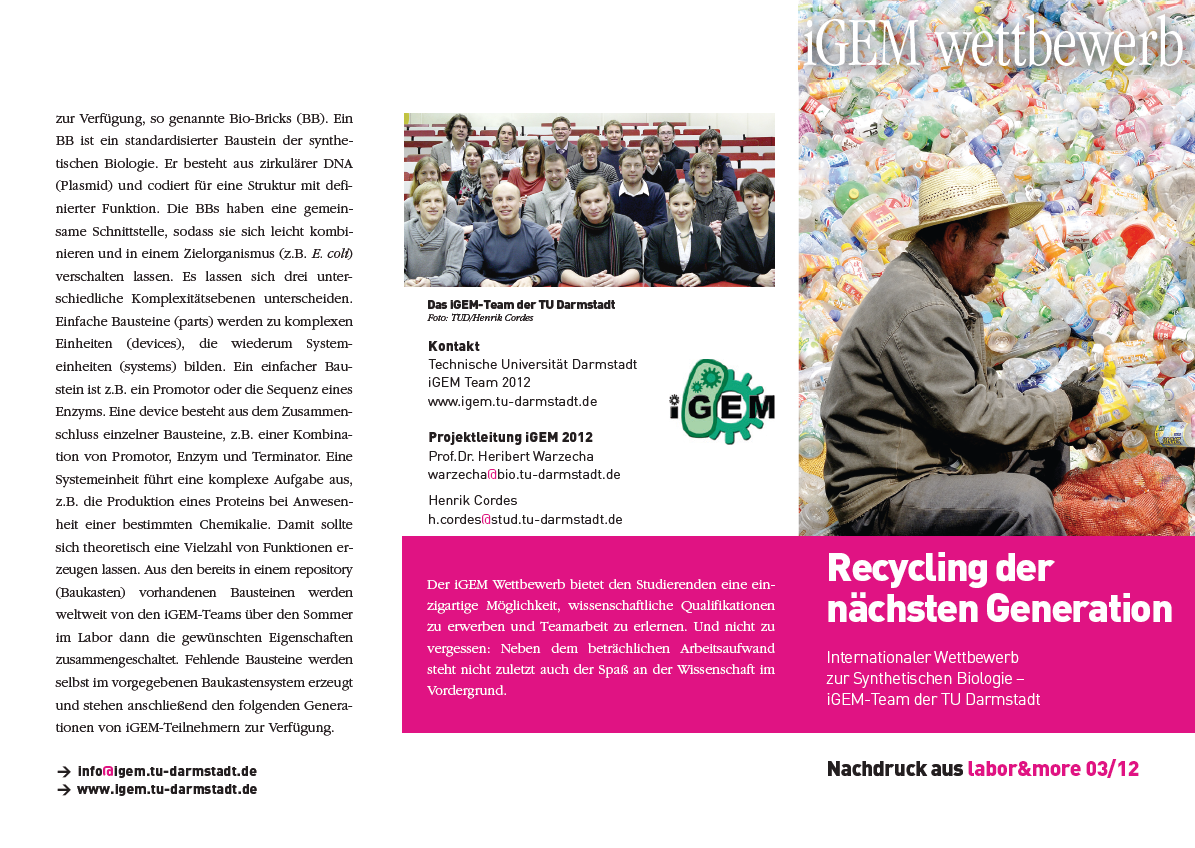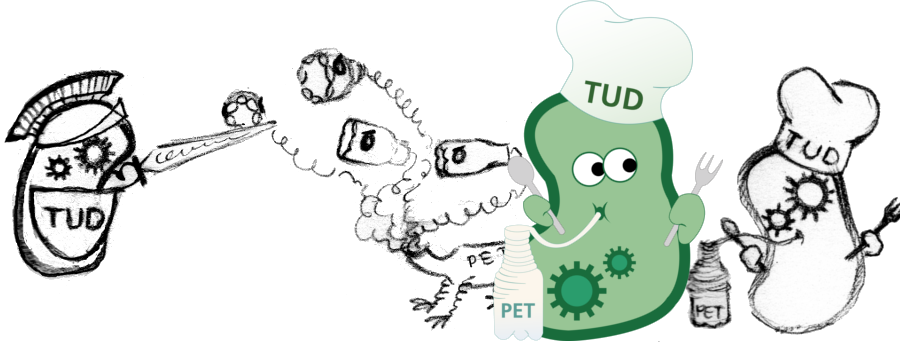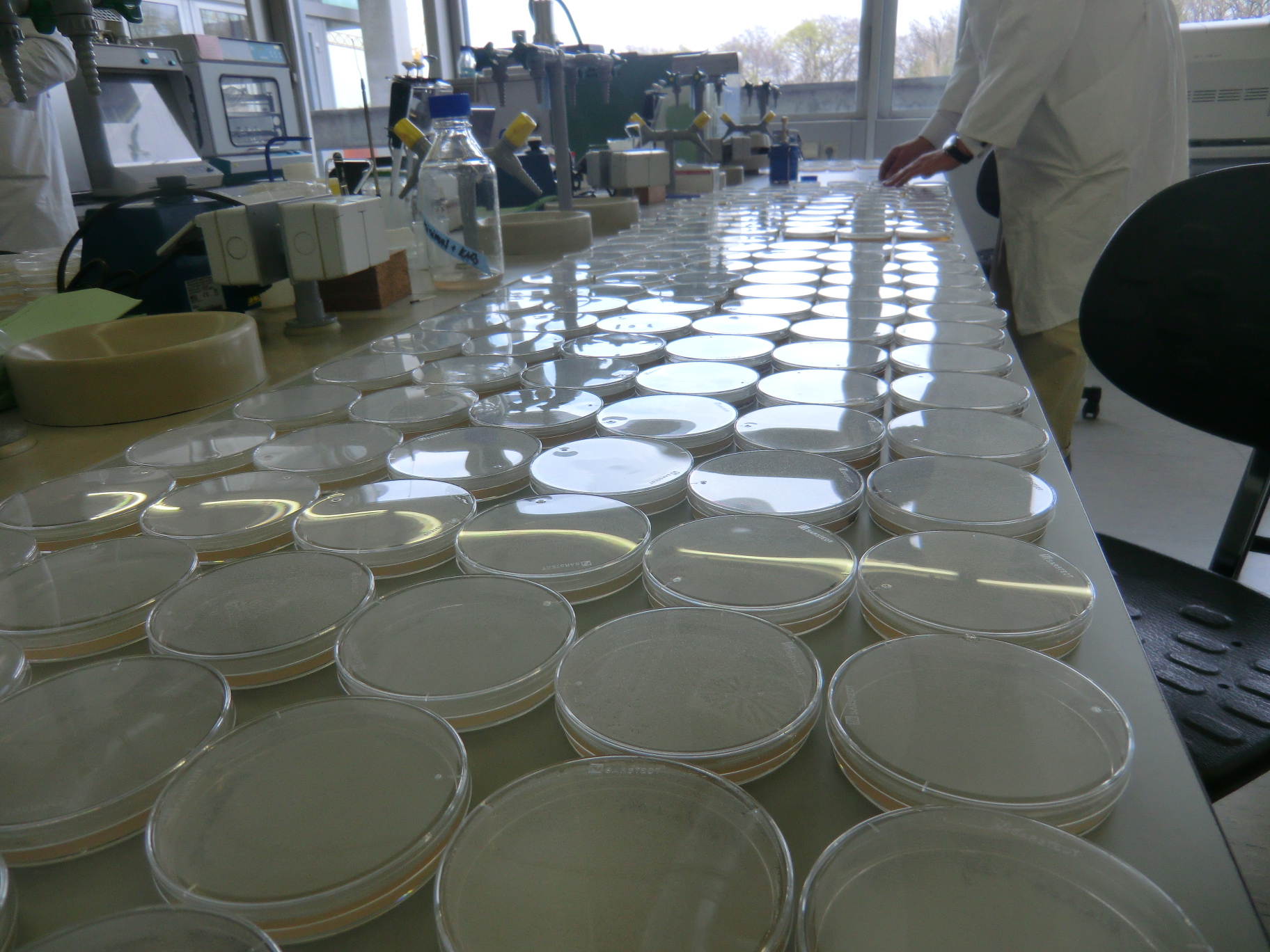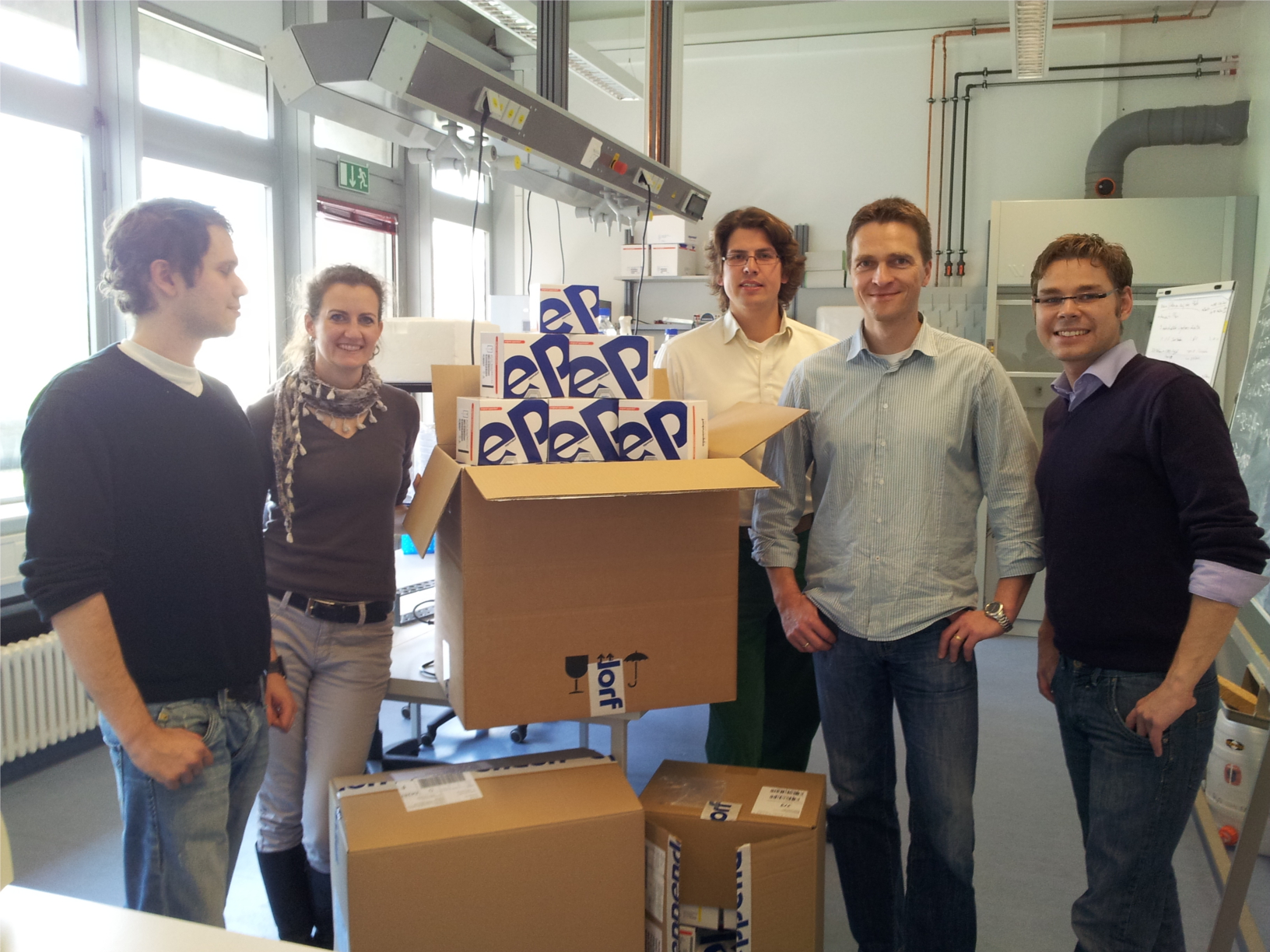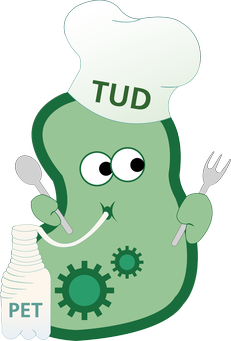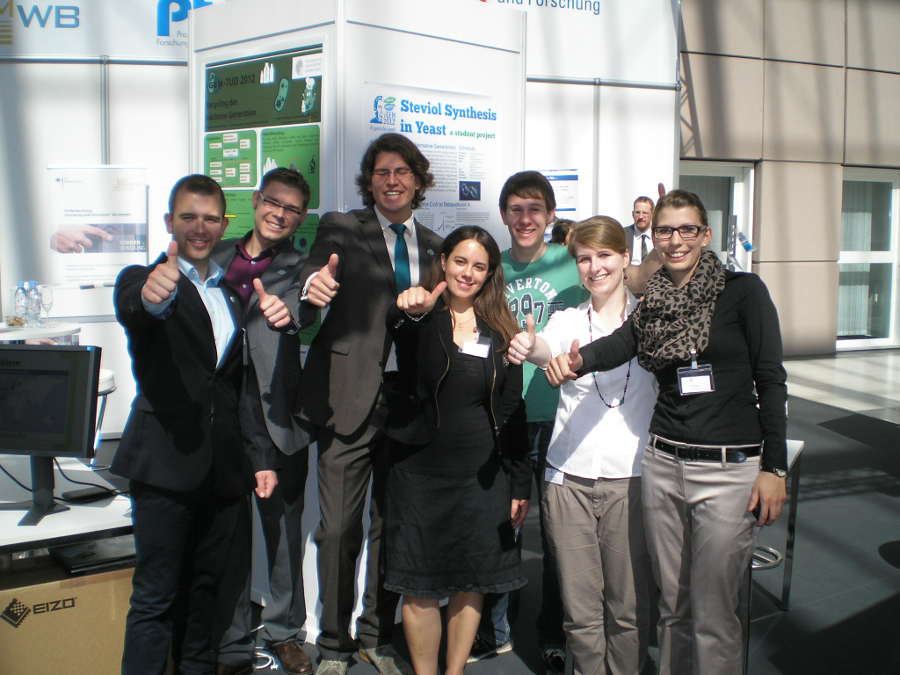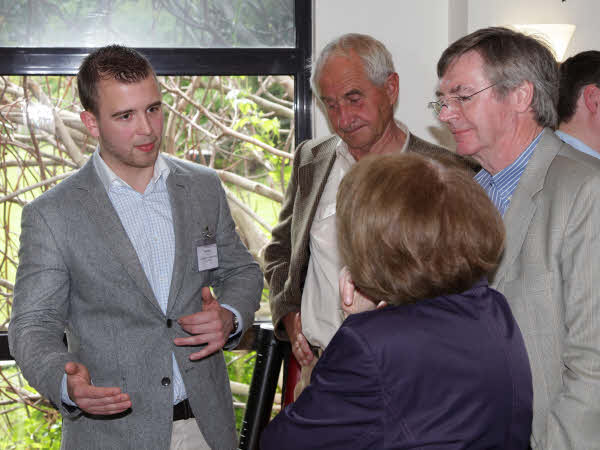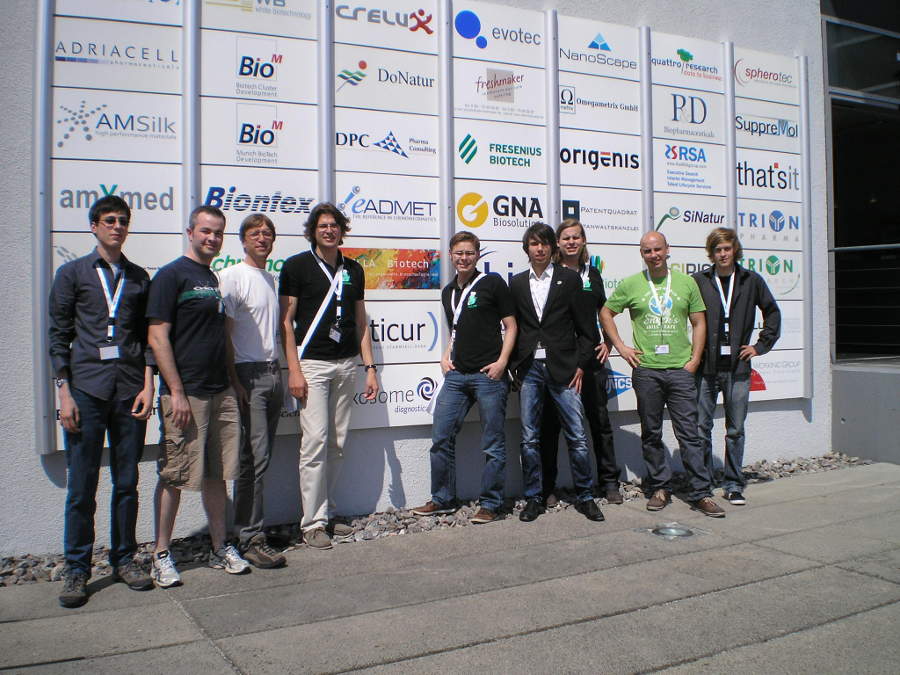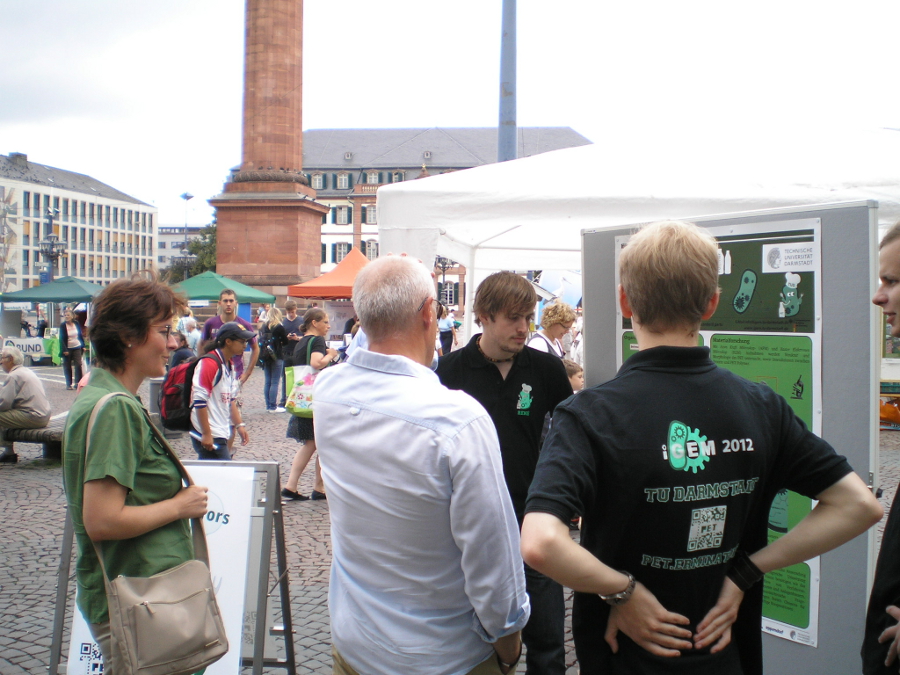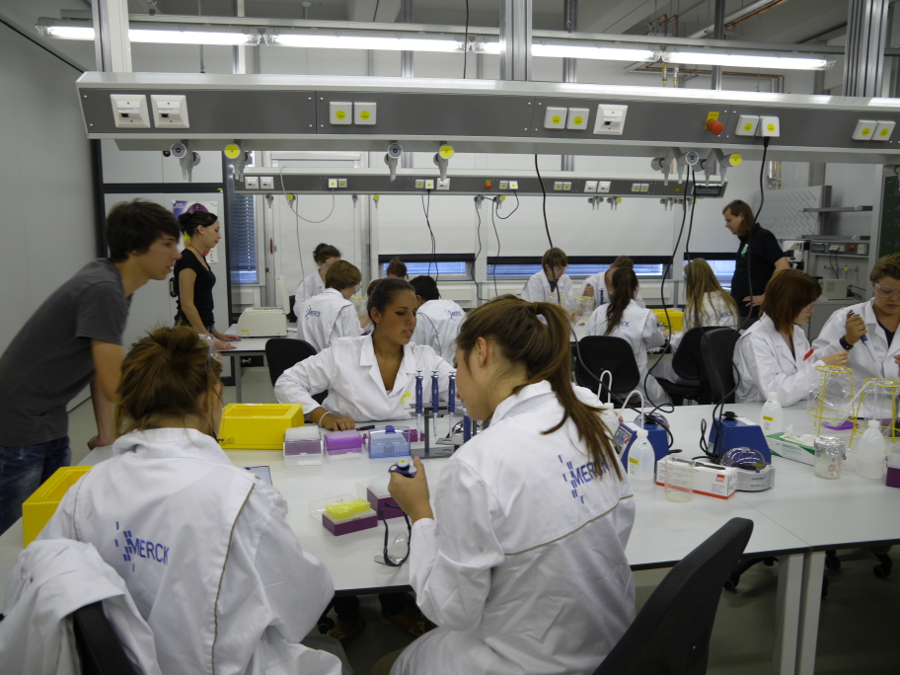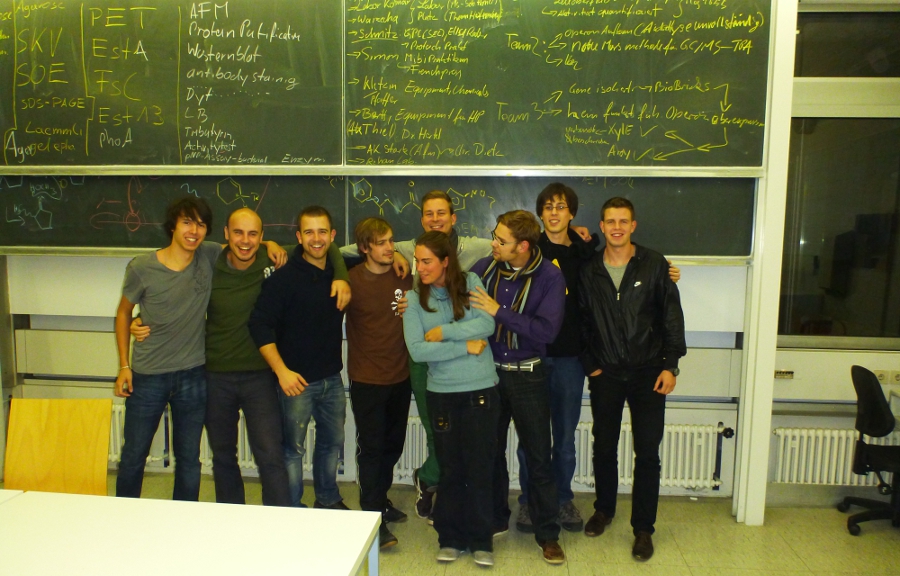Team:TU Darmstadt
From 2012.igem.org
Overview
The increasing environmental pollution with plastic waste, like bottles, textiles, and injection-molded components, has created a serious risk for nature and humans. Currently over 150 million tons of plastics are produced per year, the major share being polymer [http://en.wikipedia.org/wiki/Polyethylene_terephthalate polyethylene terephthalate] ([http://en.wikipedia.org/wiki/Polyethylene_terephthalate PET]). With annual global production exceeding 100 million tons in 2010, [http://en.wikipedia.org/wiki/Polyethylene_terephthalate PET] on its own has created a serious waste issue. While in Western countries less than 70% of [http://en.wikipedia.org/wiki/Polyethylene_terephthalate PET] production are recovered through conventional recycling, a huge amount of [http://en.wikipedia.org/wiki/Polyethylene_terephthalate PET] in developing countries is disposed of as unprocessed waste in the environment. This often makes it into rivers and thus finally ends up in the world’s oceans.
Recently it was discovered that erosion of [http://en.wikipedia.org/wiki/Polyethylene_terephthalate PET] in a maritime environment ultimately leads to the creation of nanoparticles with undesired characteristics, as these particles tend to accumulate toxic substances on their surface. There are already some areas in the world’s oceans where measurements have found the concentration of plastic micro-particles to be higher than those of plankton. This is highly alarming, especially since the adverse long-term effects of these particles are yet unknown.
In view of this growing environmental threat and serious health risk, developing new methods for [http://en.wikipedia.org/wiki/Polyethylene_terephthalate PET] degradation has become an urgent issue. So far, biological processes play no role in recycling, as its chemical properties make PET inert to biological degradation. At present there is no microorganism known which is able to digest synthetic plastics.
Our team from TU Darmstadt designed a bacterial recycling system employing [http://ecoliwiki.net/colipedia/index.php/Escherichia_coli E. coli] that uses PET waste as a resource for synthesis of new chemical compounds. The proposed solution pursues PET decomposition into its monomers, transportation into [http://ecoliwiki.net/colipedia/index.php/Escherichia_coli E. coli] and leading via terephthalic acid (TPA) to a high-value end product (e.g catechol or amino acids). The latter’s specification is determined by the inserted enzymes to build new metabolic pathways.
Our mission
The declared goal of our project is to generate a genetically modified micro-organism, which will decompose PET (Polyethylene terephthalate, the main component of plastic bags, plastic bottles etc.) into useful monomers. So far, PET is deemed non-biodegradable and there is yet no known way to recycle it completely. The respective process has to be designed in such a way that the outputs produced can subsequently serve as useful raw material input for other microbial systems. Preferably, these materials should become an economically attractive basis for further useful compounds applicable in the chemical and pharmaceutical industry.
More information concerning the how's and who's of this project can be found in the project description.
News
02/11 Launch of the iGEM TU Darmstadt website
The official [http://www.igem.tu-darmstadt.de/index.en.jsp TU Darmstadt website] of the iGEM 2012 team is now online. Hence we will inform you about current events and the progress of the team.
03/05 First media response
We've got our fist media response. Our project was published in [http://www.laborundmore.de labor&more] (in German) a monthly laboratory journal. Want to take a look inside? Feel free to [http://www.igem.tu-darmstadt.de/media/igem/material/laboremore.pdf read] (in German).
03/31 iGEM 2012 registration closes
Now it's official! The [http://www.tu-darmstadt.de/index.en.jsp TU Darmstadt] participates in the [http://en.wikipedia.org/wiki/International_Genetically_Engineered_Machine iGEM] competition for the very first time. Together with 11 teams from Germany and a total of 193 teams that registered for 2012.
04/20 We've got ourselves a logo
Inessa Popova did an amazing job creating a plushy mascot based on our scrawly sketches and PET.er is its name.
04/26 First Sponsor(s)
Our iGEM Team was able to gain its first sponsor. We persuaded the people of BRAIN, a local (Zwingenberg) biotechnology company to supply us with lab equipment and consumables. For more information take a look at our sponsors section.
05/02 Laboratory work in progress
The first iGEM lab of the [http://www.tu-darmstadt.de/ TU Darmstadt] is ready to go. We would like to thank Prof. Simon, Prof. Warzecha and Tamara Hess who gave us advise on the material requirements for the targeted experiments and provided us with the necessary working space. A second lab, a 7th floor space with a breathtaking view on the city of Darmstadt and skyline of Frankfurt, will be available soon.
05/03 BioBricks
The [http://partsregistry.org/Help:An_Introduction_to_BioBricks BioBricks] arrived and we're already running out of pipette tips, We are excitedly anticipating the first colonies to grow.
05/08 Donation of Eppendorf AG
With great joy and pleasure we received a generous donation of the Eppendorf AG, presented to us by Dr. Cora Burmeister. Now that we're high on tips we can go right back at work.
06/15 Project description online
We've got it on black and white. Our team is developing a microbial recycling system called PET.er that is able to degradate and use PET for its metabolism.
06/22 Achema
We attended the Achema in Frankfurt. The world exhibition congress on chemical engineering, environmental protection and biotechnology using the opportunity to meet the iGEM team Frankfurt.
06/26 4. SEC annual meeting
Our iGEM team took the opportunity and showcased two posters on the 4.th SEC annual meeting. For more details visit the GDCh website or our symposia section.
07/02 Biotechnology 2020+
Over 200 representatives from academia, business and politics gathered at the [http://www.biotechnologie.de/BIO/Navigation/EN/root,did=153584.html?listBlId=74464& Biotechnology 2020+ event] in Berlin to discuss possible future developments in biotechnology. Among them were members of all eleven German iGEM teams, including ours. This gave us a perfect chance to present and discuss our projects with the others and people of the scientific community.
07/03 Panel discussion
We featured a panel discussion in the premises of the [http://www.staatstheater-darmstadt.de/ Staatstheater Darmstadt] as contribution to the human practice section. As a result of the panel discussion our team was invited to the Umweltbörse Darmstadt.
07/27 CAS meeting in Munich
We took the chance and went to the [http://www.en.cas.uni-muenchen.de/index.html CAS] symposium at Munich and had a call on our sponsor Ella Biotech.
08/25 Umweltbörse Darmstadt
In consequence of the panel discussion and the decision of the German iGEM teams to host a roadshow in their corresponding cities we stood up to the challenge and deployed our pavilion in the center of Darmstadt.
09/07 Safety
We passed the first real deadline. We've been assigned to the environment track, finalised the official team profile and polished our safety section.
09/07 Classes
In the context of the human practice idea we invited a biology class of the Ludwig-Georgs-Gymnasium (LGG) to a one day excurse on biotechnology. For more information on what we did visit the classes section.
09/26 Judging form
It's medal time. Is it? We finished the judging form and are expectantly looking forward to the jurys decision.
09/27 Wiki freeze
The time (5:59:59 in Germany) has finally come to wave goodby to our wiki (the chance to edit it, to be more precise). We are glad, that we made it and have the chance to sleep again.
10/03 Printing PET.er
We designed a 3D PET.er and hope that we are able to print him in time.
10/05 iGEM 2012 Regional Jamborees: Europe, Asia, Latin America
We are ready to hit the road to Amsterdam in the Netherlands. We'll finally be able to present the results of our hard work and have a very good time with all the other dear iGEM participants.
10/12 iGEM 2012 Regional Jamborees: Americas-East, Americas-West
The regional jamborees will soon be over and the team selection for the world championship announced.
11/02 iGEM 2012 World Championship Jamboree, MIT
We've made it to the finals (maybe). We're going all in and wish the other teams all the best!
 "
"
